This is going to be a bit convoluted but here goes.. GCC isn’t a monolithic compiler, instead it’s various parts are separate programs. This lets us tackle it one part at a time. And/Or bypass a lot of it until I want to tackle it.
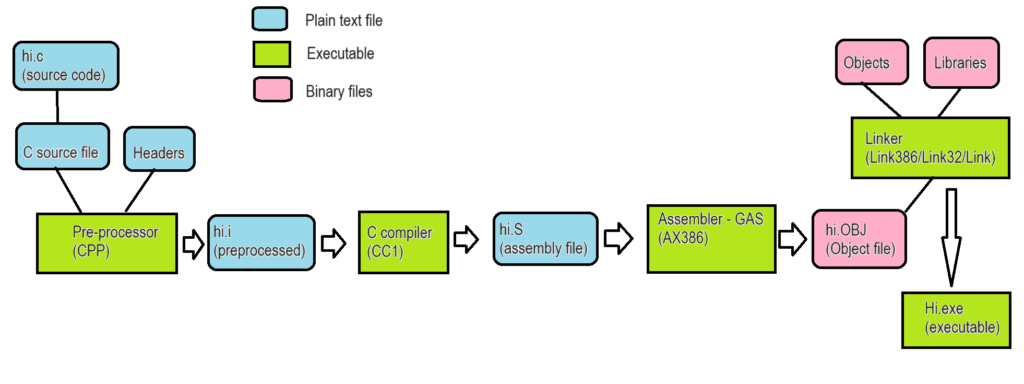
I’m sure many people have explained this far better than I ever could but in C you write source files (obviously), the pre-processor reads those and ‘header’ files that describe interfaces to libraries, other objects, various macros and definitions (magical numbers) and the pre-processor will read those files, and do simple macro expansion and test insert/replacements to generate a single .i file at the end of it’s run.
The C compiler (cc1) now reads that single .i file and translates it into native assembly. This allows for ‘mid/high level’ aspects of C to be machine independent (portable) but now will be written into a very system dependant assembly file, the single .S file. One thing of note is that so far everything is text files. You can edit the assembly file as you would any document, or even further ‘process’ it if needed/wanted.
The assembler ax386 (GAS) will then read the single assembly file and write a a binary object file hi.OBJ. There typically isn’t all that much to be said about assemblers although fancier ones allow for really strong Macro capabilities like Microsoft MASM.
From here on, it’s all binary objects!
The linker then takes your object files, and links them together with other system objects and system libraries into an executable, in this case. Linkers can build all kinds of other things, but for now we’re just pretending its static C compilation like it’s the 1970’s.
At it’s heart GCC processes text files.
The first part in this insane experiment, is to build GCC 1.40 with Microsoft Visual C++ 1.0. Surprisingly it didn’t take an insane amount of messing with stuff, and I got an executable! But everything it compiled failed to assemble. Looking at this fragment, even if you don’t know i386 assembly you might spot the error:
main:
pushl %ebp
a b,c
pushl %esi
pushl %ebxYeah, it’s the “a b,c” part. Those are NOT valid i386 opcodes!
Just because it compiled didn’t mean it actually worked.
I used MinGW to build the same source, same Makefile, and I got a working executable. Annoyed I started compiling random files with Microsoft C, and finally found the file that broke it all, it turned out to be insn-output.c needing to be compiled with the “/D__STDC__” flags. A quick modification of the Makefile and now I have a working CC1!
Okay, great, it’s well known back in the early dangerous ages of the 1980’s/1990’s that everyone wasn’t running Linux, nor were binary distributions of GCC that far spread, rather I think to re-enforce the source was available it was expected that you’d use your system compiler. Systems like DJGPP/EMX take the path of binding a.out object files into something that MS-DOS can run via a dos extender, or the bind utility to allow you to run the a.out on OS/2. What I wan’t to do is verify that in fact Windows NT was a viable host for GCC back in the public pre-releases of 1991.
I’m sticking with the December build 239 version as it has working floating point. Something that GCC has intrinsic support of, and I don’t feel like trying to work out emulation.
The next step is to try to build it with the family mode-OS/2 version of the C compiler, which of course lead to the real issue of this 16bit hosted cross compiler:
cl386 /u /Od /Ic:\MSVC32S\C386\INCLUDE /I. /Iconfig /c combine.c
Microsoft (R) Microsoft 386 C Compiler. Version 1.00.075
Copyright (c) Microsoft Corp 1984-1989. All rights reserved.
combine.c
combine.c(1734) : fatal error C1002: compiler is out of heap space in Pass 2
NMAKE : fatal error U1077: 'C:\WINDOWS\system32\cmd.exe' : return code '0x2'
Stop.
Very frustrating. I tried mixing and matching from Visual C++ 1.0 & this old compiler, and while it did compile, it doesn’t run. does it mean anything?!
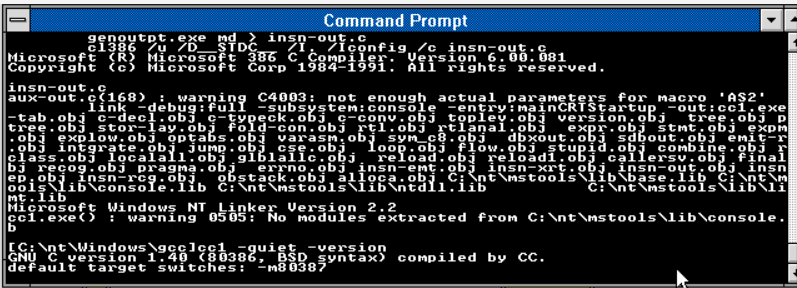
I should point out that this should be an expected working configuration as GCC does build on Xenix using the 32bit Microsoft C 5.1/386 compiler. Furthered again that Xenix and these 1991 versions of NT use the same 32bit OMF object format. And expanding on the Xenixnt experiment using the Xenix’ified GAS assembler with old Visual C++ includes & libraries to produce a possible retro-early port of GCC to NT, the next move is to bulid GAS on NT.
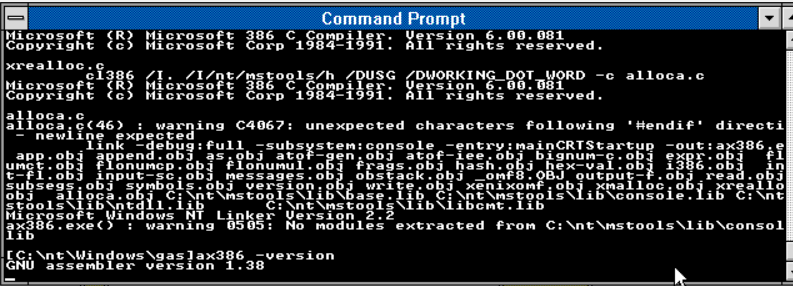
GAS gave me some weird issues with ctype.h where it runs fine with the one from Visual C++ 1.0 but the OS/2 & NT pre-release both fail. However the old Pre-release compiler cannot deal with the much newer ctype include file. So after much hammering I amputated whatever was bothering it, and it’s just enough to build & run. Great!
Going back to the phases, I used a simple hello world program:
void main() {
printf("Hello World!\n");
}While not being a good program, it doesn’t include stdio.h, nor does it return anything. It’s terrible. But in this case it allows me to be lazy and sidestep the pre-processor cpp.exe. This way I can just directly run it through cc1 and get my assembler file hi.S
Next I pass it to ax386 (GAS) and get the resulting object file hi.OBJ
And finally link it with link.exe in this case.
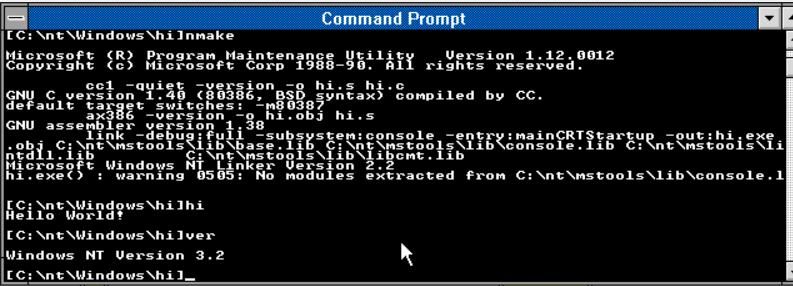
And with all the drama I’ve now compiled a simple hello world program on Windows NT.
If it were 1991, I would hollow out gcc.c so it doesn’t use signals or forks to invoke the needed phases, and of course build the pre-processor. In addition, libgcc needs to be compiled to allow for floating point operations to work correctly. None of which is impossible, although I’m not sure it’s all that needed as it isn’t 1991.
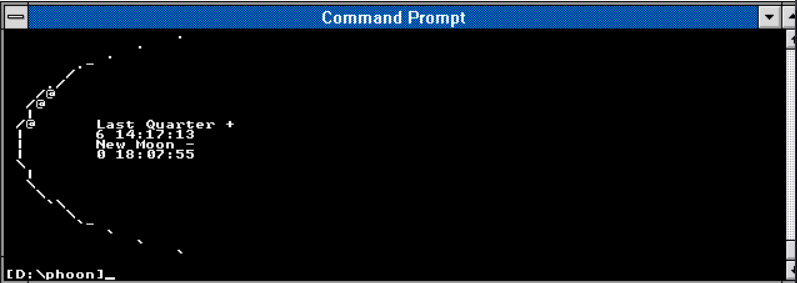
With a little bit more work, I got the floating point support to compile, which relies on both a working ‘native’ compiler, and a working GCC to compile the 2nd half. I usually use phoon, or Phases of the Moon, to test floating point, and as you can see, it’s working!
I’m not sure if there was a 32bit version of Microsoft C/386 available for Microsoft OS/2 2.00 betas. Also, I don’t know if the Microsoft link386 for OS/2 can also link Xenix 386 object files? Would it have been possible to bootstrap GCC/GAS on Microsoft OS/2 2.00? I really don’t know, and as of this writing no versions of the old Microsoft OS/2 2.00 betas have surfaced.
** update from the future, turns out that I found a way to convince the cl386 compilers from the NT Pre-Releases in 1991 to re-build an existing GCC that was built for NT. The catch is the linker, LINK386 of course, as the format was constantly changing. However the object files are fine, and I was able to just copy them over on diskette and re-link the compiler. It even ran. It’s not tested at all, so it turns out the 1989 compiler wasn’t good enough, but the 1991 was.
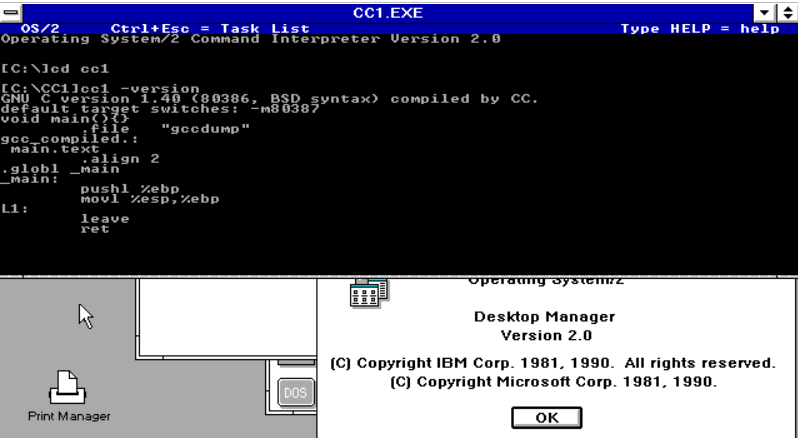
It’s interesting to me to see that even before GCC 2.6, that vintage versions from 1991 would compile and run directly on Windows NT.
I uploaded the source on github, along with some binaries.
